Blog

Affiliate marketing is solid, but mobile affiliate marketing is the real game-changer! Most visitors come from mobile devices, making the platform the top dog in terms of traffic. This is just a rallying cry for marketers still meticulously optimizing their desktop ad campaigns. Aside from that, the app market is constantly evolving, further bolstering the mobile realm over time.
Read the article to learn how to earn money in mobile affiliate marketing and master campaign setup.
Mobile CPA marketing is a strategy that taps into the extensive use of mobile phones to create revenue through partnerships and referrals. Simply put, it’s a performance-based marketing approach where businesses compensate affiliates for generating mobile traffic. Marketers earn rewards based on key performance indicators (KPIs) set by businesses, such as sales or the number of downloads.
Key players in affiliate marketing for mobile:
Let’s move beyond the basics and delve into facts.
The stats shout loud about how much folks love mobile traffic. In October, it hit 64,1%, as per Similarweb. Mobile usage is the boss all year long. For the full scoop, see the data by platform from Similarweb, including year traffic share.
While mobile traffic is growing, the app market is gaining traction too, which can be beneficial for affiliates. Leading mobile apps by download are social networking apps and games, according to the Statista forecast. Absolutely, social media and games have this knack for keeping people hooked for a long time. Marketers can make the most of this opportunity to interact with mobile users.
Typical traffic sources that generate mobile traffic include:
Informed by offer restrictions, experience, and insights, affiliates select the sources they believe will yield the best results.
Mobile offers are highly specific, and their types determine which conversion flow can be employed. Let’s discuss them!
It’s about services users subscribe to through mobile operating systems. Mobile subscriptions include everything you can envision, from dating to games and horoscopes.

What they have in common is the subscription model. The forte of such offerings is the ease of generating leads. Users walk across the sale funnel more smoothly than ever before, because they don’t have to leave payment card data. Instead, the funds are withdrawn from the mobile account.
Conversion flows: 1-2 click flow, PIN Submit, Premium SMS (Click2SMS, MT/MO) and USSD.
Most likely, they seem to be complex, but this is true only at first glance. You needn’t be fussy about how technologies work, as the only thing separating users from the conversion is 1-2 clicks, the input of phone numbers, or a short verification code.
People use mobile apps for everything – from ordering food to getting a taxi or finding a date. Businesses get it; they know we prefer this pocket-sized convenience over being stuck to a desktop. That’s why apps take the top spot.
Let’s elaborate on what apps users are interested in.
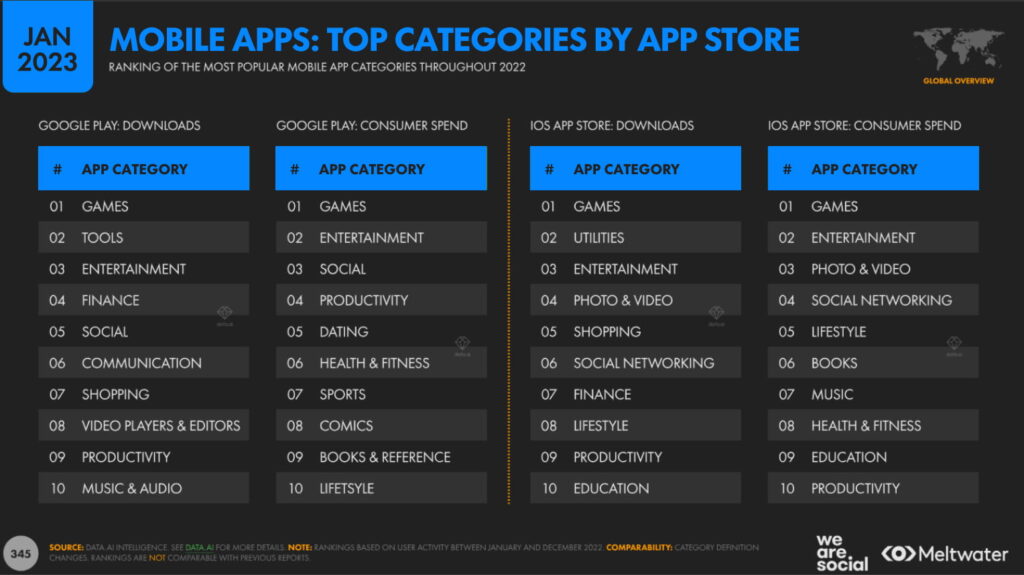
Regardless of the camp, users choose – iOS or Android – they all enjoy playing games. Users on both operating systems are avid consumers of entertainment and are open to investing in relevant applications. If you analyze the stats further, intriguing patterns emerge. For example, Apple users give a high priority to photo and video content apps, while Android shows a greater affinity for dating apps.
To spot trends, you can observe how high-profile apps gain popularity on Data.ai. According to the latest data, the trend for dating apps is growing for iOS users in the USA, a good sign for affiliates seeking the most lucrative customers.
Conversion flows: CPI (cost per install), CPL and Trial.
The most basic type of conversion is CPI (Cost Per Install). Conversion is counted after the app is downloaded. Alternatively, a user is considered a lead if they take any action within the app, such as registering or subscribing.
This vertical rules the app market, as users regard utilities as indispensable for using their smartphones. For a better understanding of utilities, recall system applications: file managers, data storage, calendars and maps. Similar, yet more advanced programs can be downloaded from a browser or app marketplaces – App Store and Google Play.
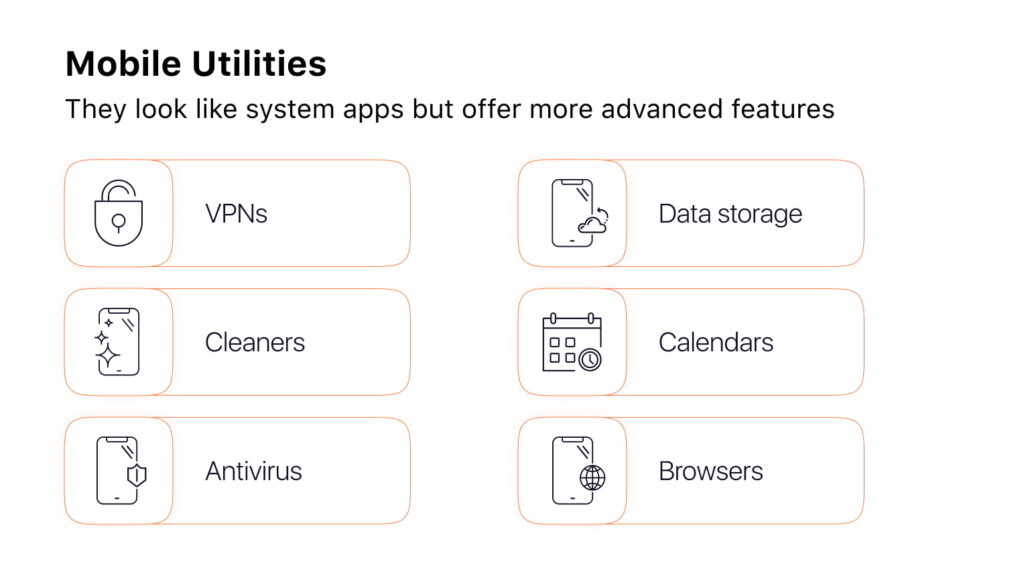
True fans of utilities are the iOS audience.
Conversion flows: CPI (cost per install), CPL and Trial.
Payouts can vary depending on app functionality and monetization strategy. In some cases, the conversion is counted provided that the user clicks on the affiliate link and pays for a subscription or avails of freemium access.
Mobile games save from boredom that can take over users anytime, anywhere. As a source of entertainment and leisure, mobile games attract a vast and diverse user base, creating a fertile ground for capturing loyal customers. Game genres coming on rage are RPG, strategy, puzzles, shooter, simulation and action.
Conversion flows: CPI, in-app purchases, upgrades
Marketers earn a commission for every mobile game download, a regular case of promoting mobile apps. Despite this, it’s common for games to be downloaded for free, and then users purchase in-game items to access premium features, virtual goods, or additional levels. Some mobile games offer upgraded versions or premium content, and marketers earn commissions when users choose these options.
Hunting for the most lucrative mobile offers? Swing by the following mobile affiliate networks:
Various types of mobile advertising cater to running mobile traffic, each designed to engage users effectively and optimize conversions.
Here are several popular ad formats for mobile traffic.
Push notifications surpass traditional banners, especially when coupled with mobile traffic – a true marketing powerhouse.

A key aspect of this format lies in its direct user engagement. Push ads are delivered straight to mobile screens after the user permits an ad subscription.
Full-screen ads that appear between content transitions or during natural breaks in the app or mobile website. They are visually striking due to their full-screen size, providing an impactful experience.
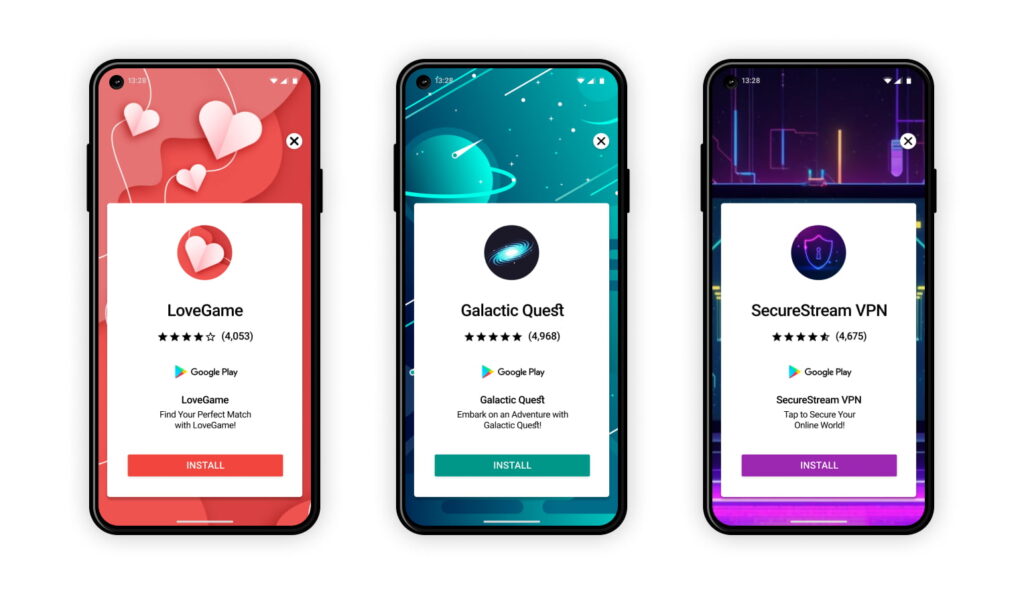
Video ads are an effective way to capture and retain user attention in an era when high-speed internet is prevalent on mobile devices. They are particularly valuable in conveying complex messages or showcasing products and services in action.
The level of involvement depends on the chosen video type; there are 3 major kinds of video advertising:
Read our article about video advertising in light of the dating vertical, which is a perfect fit for this format.
Playable ads take user engagement to the next level by allowing users to interact with a mini-version of a mobile game or app before deciding to download it. This interactive experience not only captures attention but also provides users with a firsthand feel for the product or game.

The most frustrating part is that playable ads demand a creative touch and animating the content, which is time-consuming. Producing banners is much easier.
Contrary to their name, playable ads are not confined to promoting games only; in fact, they can be adapted to any vertical in the market, for example, dating. A playable ad for a gambling app can look like an adventure mini-quest.
Users within apps tend to be more receptive to ads, potentially fostering greater ad engagement and loyalty. Unlike internet browsing, where users encounter ads frequently, in-app ads can be less intrusive.
The format accommodates various ad types, ensuring diverse and effective promotion within the app environment.
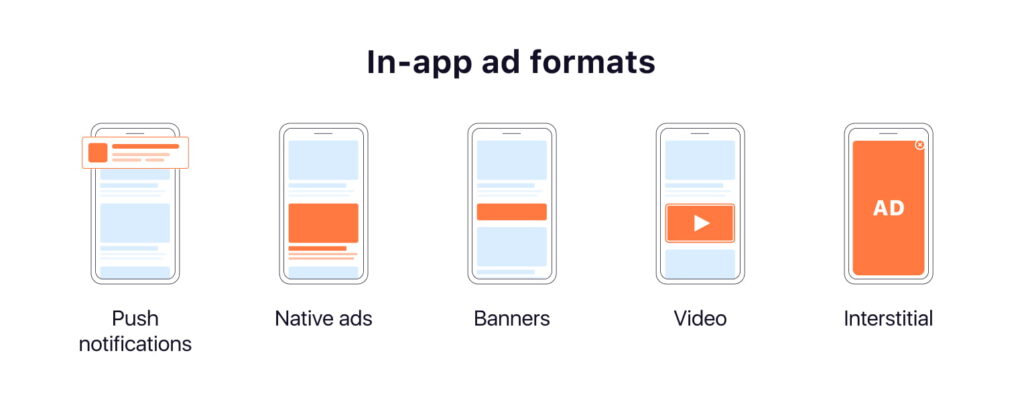
This versatility, combined with the less intrusive nature of in-app ads, makes them a powerful tool for marketers aiming to drive meaningful interactions.
Platforms not explicitly labeled as mobile traffic sources often host a substantial number of mobile users. The extensive presence of mobile audiences inevitably influences traffic sources, compelling affiliates to adeptly navigate the mobile realm to maximize their profits.
Delve into the finer points of campaign setup in ad networks.
Responsive design is the key to ensuring a seamless user experience that maximizes engagement. However, it’s essential to consider the fast loading time for the offer page. The page must be lightweight, ensuring swift loading even in areas with low data speeds. If you want to check a target page’s loading time, you can use special services, such as tools.pingdom.com.
Mobile penetration varies on GEOs. In some countries, desktop traffic still largely prevails. And although each ad network has a distinct set of top-performing countries to run mobile campaigns, it’s always a good idea to get to know the mobile landscape altogether.
Most mobile traffic comes from tier-3 countries, primarily from African regions: Algeria, Nigeria, Cameroon, Tanzania, South Africa, Morocco;
Examples of countries where desktop traffic reigns at the moment: Guatemala, Honduras, Nicaragua, Costa Rica, Argentina, Paraguay.
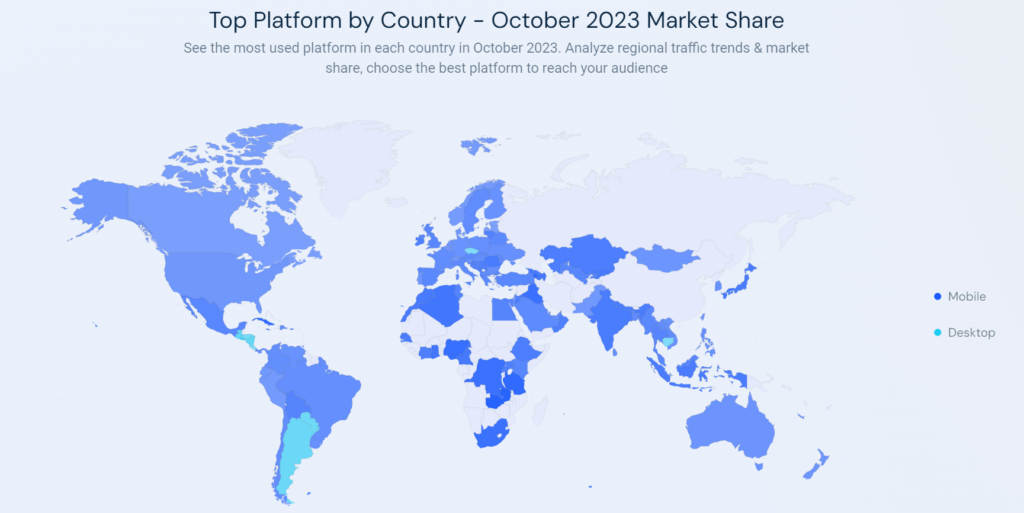
Traffic from tier-3 geos, namely APAC countries, is also beneficial for running mVAS offers.
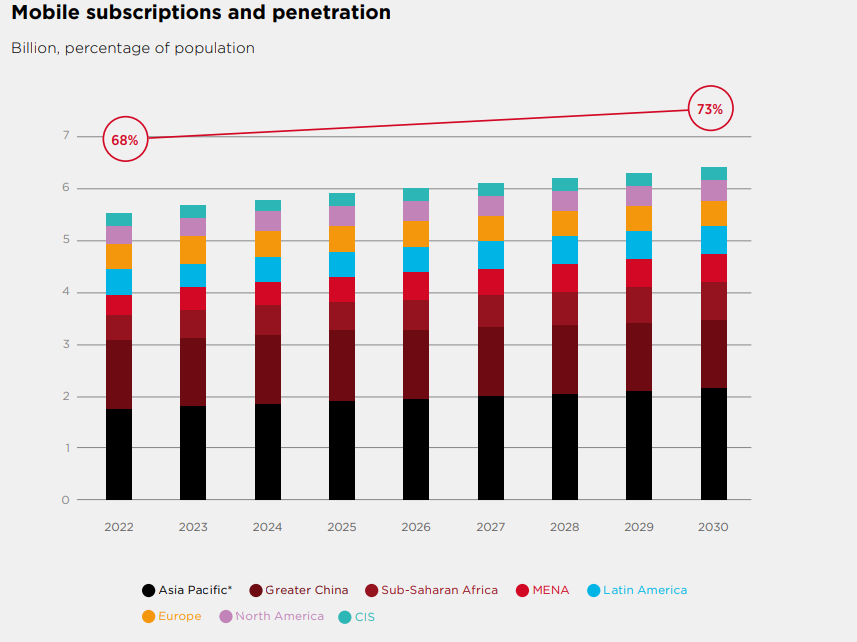
If you are looking for high-quality traffic from more solvent countries, keep an eye on the following GEOs: the USA, Germany, Mexico and Hungary.
RON campaigns aren’t a one-size-fits-all solution for running mobile traffic. If you are going to deal with mVAS offers, you are limited to specific carriers. Going to promote an app? You need to choose from iOS and Android, depending on what platform is compatible with the offer. In a nutshell, technology makes all the difference. For instance, users with a 3G connection may experience slower loading times for video ads compared to those on 5G-enabled devices. As a result, mobile campaigns using 3G for video advertising are less likely to convert.
Other than that, you shouldn’t narrow down your mobile targeting unless you want to create like an MVP campaign to test your offer. If so, select 7-11 Android versions or 15-16 iOS versions, and the Chrome browser, globally the most popular.
Continuously monitor and adapt to evolving mobile trends. The mobile landscape is dynamic, and staying attuned to shifts ensures your campaigns remain effective and competitive.
Current trends in mobile marketing, according to the GSMA research:
Mobile affiliate marketing offers immense opportunities for those who understand its dynamics and adapt their strategies accordingly. By understanding and approaching this sector the right way, affiliates can significantly benefit.
Affiliate marketing is solid, but mobile affiliate marketing is the real game-changer! Most visitors come from mobile devices, making the platform the top dog in terms of traffic. This is just a rallying cry for marketers still meticulously optimizing their desktop ad campaigns. Aside from that, the app market is constantly evolving, further bolstering the mobile realm over time.
Read the article to learn how to earn money in mobile affiliate marketing and master campaign setup.
Mobile CPA marketing is a strategy that taps into the extensive use of mobile phones to create revenue through partnerships and referrals. Simply put, it’s a performance-based marketing approach where businesses compensate affiliates for generating mobile traffic. Marketers earn rewards based on key performance indicators (KPIs) set by businesses, such as sales or the number of downloads.
Key players in affiliate marketing for mobile:
Let’s move beyond the basics and delve into facts.
The stats shout loud about how much folks love mobile traffic. In October, it hit 64,1%, as per Similarweb. Mobile usage is the boss all year long. For the full scoop, see the data by platform from Similarweb, including year traffic share.
While mobile traffic is growing, the app market is gaining traction too, which can be beneficial for affiliates. Leading mobile apps by download are social networking apps and games, according to the Statista forecast. Absolutely, social media and games have this knack for keeping people hooked for a long time. Marketers can make the most of this opportunity to interact with mobile users.
Typical traffic sources that generate mobile traffic include:
Informed by offer restrictions, experience, and insights, affiliates select the sources they believe will yield the best results.
Mobile offers are highly specific, and their types determine which conversion flow can be employed. Let’s discuss them!
It’s about services users subscribe to through mobile operating systems. Mobile subscriptions include everything you can envision, from dating to games and horoscopes.

What they have in common is the subscription model. The forte of such offerings is the ease of generating leads. Users walk across the sale funnel more smoothly than ever before, because they don’t have to leave payment card data. Instead, the funds are withdrawn from the mobile account.
Conversion flows: 1-2 click flow, PIN Submit, Premium SMS (Click2SMS, MT/MO) and USSD.
Most likely, they seem to be complex, but this is true only at first glance. You needn’t be fussy about how technologies work, as the only thing separating users from the conversion is 1-2 clicks, the input of phone numbers, or a short verification code.
People use mobile apps for everything – from ordering food to getting a taxi or finding a date. Businesses get it; they know we prefer this pocket-sized convenience over being stuck to a desktop. That’s why apps take the top spot.
Let’s elaborate on what apps users are interested in.

Regardless of the camp, users choose – iOS or Android – they all enjoy playing games. Users on both operating systems are avid consumers of entertainment and are open to investing in relevant applications. If you analyze the stats further, intriguing patterns emerge. For example, Apple users give a high priority to photo and video content apps, while Android shows a greater affinity for dating apps.
To spot trends, you can observe how high-profile apps gain popularity on Data.ai. According to the latest data, the trend for dating apps is growing for iOS users in the USA, a good sign for affiliates seeking the most lucrative customers.
Conversion flows: CPI (cost per install), CPL and Trial.
The most basic type of conversion is CPI (Cost Per Install). Conversion is counted after the app is downloaded. Alternatively, a user is considered a lead if they take any action within the app, such as registering or subscribing.
This vertical rules the app market, as users regard utilities as indispensable for using their smartphones. For a better understanding of utilities, recall system applications: file managers, data storage, calendars and maps. Similar, yet more advanced programs can be downloaded from a browser or app marketplaces – App Store and Google Play.

True fans of utilities are the iOS audience.
Conversion flows: CPI (cost per install), CPL and Trial.
Payouts can vary depending on app functionality and monetization strategy. In some cases, the conversion is counted provided that the user clicks on the affiliate link and pays for a subscription or avails of freemium access.
Mobile games save from boredom that can take over users anytime, anywhere. As a source of entertainment and leisure, mobile games attract a vast and diverse user base, creating a fertile ground for capturing loyal customers. Game genres coming on rage are RPG, strategy, puzzles, shooter, simulation and action.
Conversion flows: CPI, in-app purchases, upgrades
Marketers earn a commission for every mobile game download, a regular case of promoting mobile apps. Despite this, it’s common for games to be downloaded for free, and then users purchase in-game items to access premium features, virtual goods, or additional levels. Some mobile games offer upgraded versions or premium content, and marketers earn commissions when users choose these options.
Hunting for the most lucrative mobile offers? Swing by the following mobile affiliate networks:
Various types of mobile advertising cater to running mobile traffic, each designed to engage users effectively and optimize conversions.
Here are several popular ad formats for mobile traffic.
Push notifications surpass traditional banners, especially when coupled with mobile traffic – a true marketing powerhouse.

A key aspect of this format lies in its direct user engagement. Push ads are delivered straight to mobile screens after the user permits an ad subscription.
Full-screen ads that appear between content transitions or during natural breaks in the app or mobile website. They are visually striking due to their full-screen size, providing an impactful experience.

Video ads are an effective way to capture and retain user attention in an era when high-speed internet is prevalent on mobile devices. They are particularly valuable in conveying complex messages or showcasing products and services in action.
The level of involvement depends on the chosen video type; there are 3 major kinds of video advertising:
Read our article about video advertising in light of the dating vertical, which is a perfect fit for this format.
Playable ads take user engagement to the next level by allowing users to interact with a mini-version of a mobile game or app before deciding to download it. This interactive experience not only captures attention but also provides users with a firsthand feel for the product or game.

The most frustrating part is that playable ads demand a creative touch and animating the content, which is time-consuming. Producing banners is much easier.
Contrary to their name, playable ads are not confined to promoting games only; in fact, they can be adapted to any vertical in the market, for example, dating. A playable ad for a gambling app can look like an adventure mini-quest.
Users within apps tend to be more receptive to ads, potentially fostering greater ad engagement and loyalty. Unlike internet browsing, where users encounter ads frequently, in-app ads can be less intrusive.
The format accommodates various ad types, ensuring diverse and effective promotion within the app environment.

This versatility, combined with the less intrusive nature of in-app ads, makes them a powerful tool for marketers aiming to drive meaningful interactions.
Platforms not explicitly labeled as mobile traffic sources often host a substantial number of mobile users. The extensive presence of mobile audiences inevitably influences traffic sources, compelling affiliates to adeptly navigate the mobile realm to maximize their profits.
Delve into the finer points of campaign setup in ad networks.
Responsive design is the key to ensuring a seamless user experience that maximizes engagement. However, it’s essential to consider the fast loading time for the offer page. The page must be lightweight, ensuring swift loading even in areas with low data speeds. If you want to check a target page’s loading time, you can use special services, such as tools.pingdom.com.
Mobile penetration varies on GEOs. In some countries, desktop traffic still largely prevails. And although each ad network has a distinct set of top-performing countries to run mobile campaigns, it’s always a good idea to get to know the mobile landscape altogether.
Most mobile traffic comes from tier-3 countries, primarily from African regions: Algeria, Nigeria, Cameroon, Tanzania, South Africa, Morocco;
Examples of countries where desktop traffic reigns at the moment: Guatemala, Honduras, Nicaragua, Costa Rica, Argentina, Paraguay.

Traffic from tier-3 geos, namely APAC countries, is also beneficial for running mVAS offers.

If you are looking for high-quality traffic from more solvent countries, keep an eye on the following GEOs: the USA, Germany, Mexico and Hungary.
RON campaigns aren’t a one-size-fits-all solution for running mobile traffic. If you are going to deal with mVAS offers, you are limited to specific carriers. Going to promote an app? You need to choose from iOS and Android, depending on what platform is compatible with the offer. In a nutshell, technology makes all the difference. For instance, users with a 3G connection may experience slower loading times for video ads compared to those on 5G-enabled devices. As a result, mobile campaigns using 3G for video advertising are less likely to convert.
Other than that, you shouldn’t narrow down your mobile targeting unless you want to create like an MVP campaign to test your offer. If so, select 7-11 Android versions or 15-16 iOS versions, and the Chrome browser, globally the most popular.
Continuously monitor and adapt to evolving mobile trends. The mobile landscape is dynamic, and staying attuned to shifts ensures your campaigns remain effective and competitive.
Current trends in mobile marketing, according to the GSMA research:
Mobile affiliate marketing offers immense opportunities for those who understand its dynamics and adapt their strategies accordingly. By understanding and approaching this sector the right way, affiliates can significantly benefit.

Blog

Blog